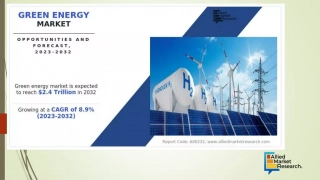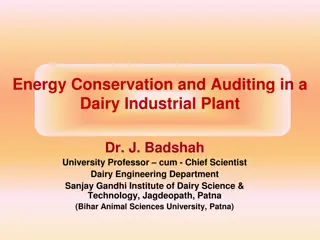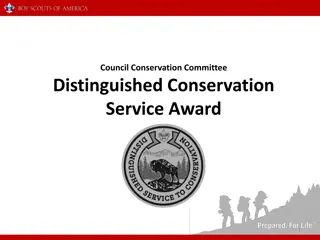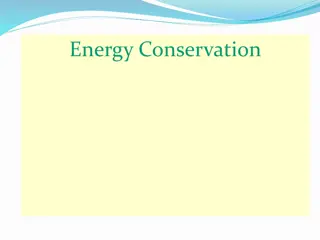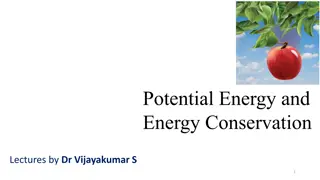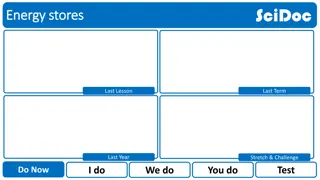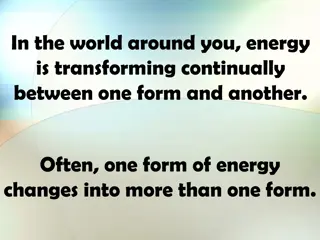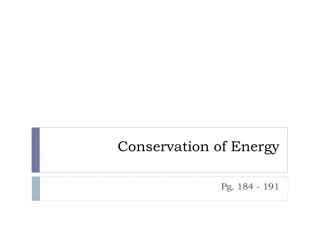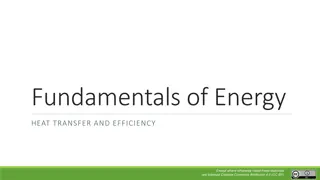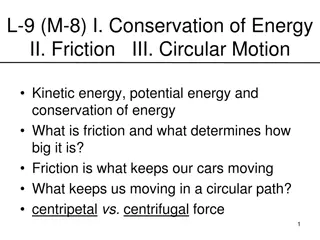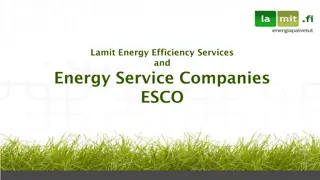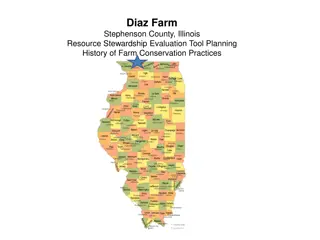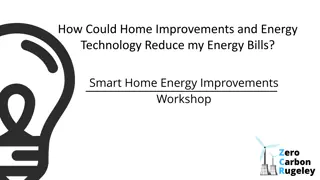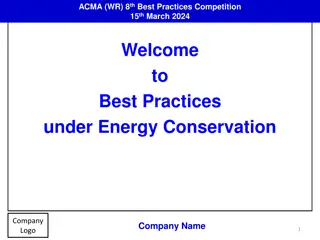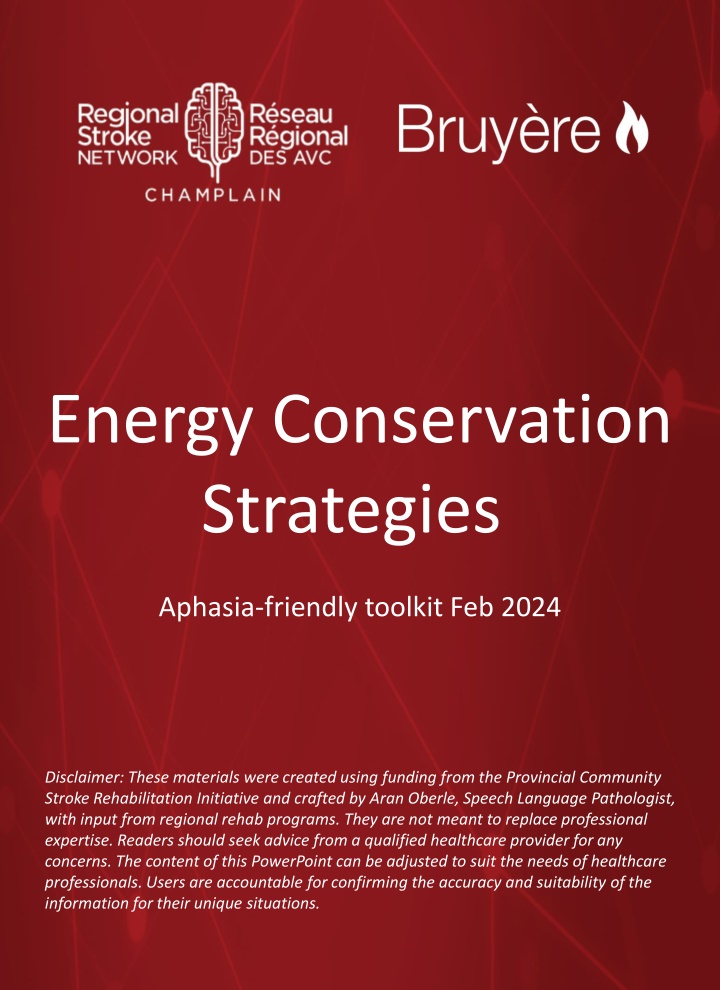
Energy Conservation and Saving Strategies for Improved Quality of Life
Explore energy conservation strategies to manage fatigue and improve daily living. Learn how to prioritize tasks, plan, pace yourself, maintain proper posture, and optimize your environment. Find ways to save energy and enhance your overall well-being. Disclaimer: Always consult a healthcare provider for personalized advice.
Download Presentation

Please find below an Image/Link to download the presentation.
The content on the website is provided AS IS for your information and personal use only. It may not be sold, licensed, or shared on other websites without obtaining consent from the author. If you encounter any issues during the download, it is possible that the publisher has removed the file from their server.
You are allowed to download the files provided on this website for personal or commercial use, subject to the condition that they are used lawfully. All files are the property of their respective owners.
The content on the website is provided AS IS for your information and personal use only. It may not be sold, licensed, or shared on other websites without obtaining consent from the author.
E N D
Presentation Transcript
Energy Conservation Strategies Aphasia-friendly toolkit Feb 2024 Disclaimer: These materials were created using funding from the Provincial Community Stroke Rehabilitation Initiative and crafted by Aran Oberle, Speech Language Pathologist, with input from regional rehab programs. They are not meant to replace professional expertise. Readers should seek advice from a qualified healthcare provider for any concerns. The content of this PowerPoint can be adjusted to suit the needs of healthcare professionals. Users are accountable for confirming the accuracy and suitability of the information for their unique situations.
Energy Saving Strategies Energy is limited. Fatigue, pain, and weakness happen when we have no more energy. Saving energy for the activities you like to do can improve quality of life. Saving energy is important perform tasks like: Things we like to do - Things we need to do each day - HOW TO SAVE ENERGY Ways to save energy and reduce fatigue are: 1. Finding easy ways to do things 2. Resting as needed Adapted from: Bruyere Continuing Care. (2020). Energy Conservation Strategies. National Health Service Greater Glasgow and Clyde. (2021). Energy Conservation, Information for patients [Brochure]. Retrieved from https://www.nhsggc.org.uk/media/261711/232434_2_0-energy-conservation.pdf
Energy Saving Strategies Remember the 5 P's to save energy: 1. Prioritize 2. Plan 3. Pace 4. Posture 5. Place Adapted from: Bruyere Continuing Care. (2020). Energy Conservation Strategies. National Health Service Greater Glasgow and Clyde. (2021). Energy Conservation, Information for patients [Brochure]. Retrieved from https://www.nhsggc.org.uk/media/261711/232434_2_0-energy-conservation.pdf
Prioritize How to Prioritize: 1. List activities you need to do. 2. Rank activities from most important to least important. Needs to be done today - Can be done later (later in the week or month) - Not necessary (never) - Adapted from: Bruyere Continuing Care. (2020). Energy Conservation Strategies. National Health Service Greater Glasgow and Clyde. (2021). Energy Conservation, Information for patients [Brochure]. Retrieved from https://www.nhsggc.org.uk/media/261711/232434_2_0-energy-conservation.pdf
Prioritize How to Prioritize: 3. Delegate tasks to helpers if possible. Groceries Family / Delivery - Meals Family / Delivery - Spring cleaning Home support worker - 4. Review task list. Can a task be easier or removed? Dry dishes with towel air dry dishes - Dust once a week Dust once a month - Cook every day cook a big meal and freeze - leftovers Cut vegetables buy pre-cut vegetables - Adapted from: Bruyere Continuing Care. (2020). Energy Conservation Strategies. National Health Service Greater Glasgow and Clyde. (2021). Energy Conservation [Information for patients]. Retrieved from https://www.nhsggc.org.uk/media/261711/232434_2_0-energy-conservation.pdf
Prioritize TASK HOW IMPORTANT WHO This Week This Month This Year Today Other 2 2 Me Family _______ Other _______ x x spouse spouse x x x x Laundry Laundry 1 1 Me Family _______ Other _______ x x Exercise Exercise Me Family _______ Other _______ Me Family _______ Other _______ Me Family _______ Other _______ Me Family _______ Other _______ Me Family _______ Other _______ Me Family _______ Other _______ Adapted from: Bruyere Continuing Care. (2020). Energy Conservation Strategies. National Health Service Greater Glasgow and Clyde. (2021). Energy Conservation [Information for patients]. Retrieved from https://www.nhsggc.org.uk/media/261711/232434_2_0-energy-conservation.pdf
Prioritize Grocery Delivery Instacart: 1-888-246-7822 Loblaws: Walmart: Home Services Ottawa West Seniors Support: - 613-728-6016 https://owcs.ca/ Nepean Seniors Home Support: - 613-829-1133 Olde Forge Support Services: - 613-829-9777 Adapted from: Bruyere Continuing Care. (2020). Energy Conservation Strategies. National Health Service Greater Glasgow and Clyde. (2021). Energy Conservation, Information for patients [Brochure]. Retrieved from https://www.nhsggc.org.uk/media/261711/232434_2_0-energy-conservation.pdf
Plan Planning and Organizing 1. Balance activity and rest: Plan 10-15 minute rests per hour to prevent fatigue 2. Alternate between heavier and lighter tasks: Ex: do not plan to do laundry and cooking in the morning 3. Take time to recharge energy: Get a good sleep Listen to relaxing music Go for a light walk Eat well and eat slowly Spend time with friends and family Adapted from: Bruyere Continuing Care. (2020). Energy Conservation Strategies. National Health Service Greater Glasgow and Clyde. (2021). Energy Conservation, Information for patients [Brochure]. Retrieved from https://www.nhsggc.org.uk/media/261711/232434_2_0-energy-conservation.pdf
Plan Organizing daily tasks: Make a list of daily/weekly/monthly tasks Daily Tasks Meal preparation Bed making Tidying up Dishes wash/dry Exercise Weekly Tasks Water plants (2x/week) Clean oven Laundry Ironing Grocery shopping Bridge (every Monday) Monthly Tasks Wash kitchen floor Wash car Pay bills Make a weekly schedule to plan oBe realistic! oDon't forget fun activities like hobbies or visiting! MONDAY TUESDAY WEDNESDAY Breakfast Breakfast Breakfast MORNING Bank Groceries Shower Laundry Lunch Lunch Lunch AFTERNOON Dusting Nap Exercise Nap Nap Dinner Dinner Dinner EVENING TV Water plants Reading Adapted from: Bruyere Continuing Care. (2020). Energy Conservation Strategies. National Health Service Greater Glasgow and Clyde. (2021). Energy Conservation, Information for patients [Brochure]. Retrieved from https://www.nhsggc.org.uk/media/261711/232434_2_0-energy-conservation.pdf
Plan Weekly schedule REVIEW: o Are too many heavy tasks together? o Are there fun activities? o Is it flexible/adaptable? o Will I conserve energy? Adapted from: Bruyere Continuing Care. (2020). Energy Conservation Strategies. National Health Service Greater Glasgow and Clyde. (2021). Energy Conservation, Information for patients [Brochure]. Retrieved from https://www.nhsggc.org.uk/media/261711/232434_2_0-energy-conservation.pdf
Pace Pacing means to go slow to save energy for later. 1. Rest before you become too tired. 2. Simplify tasks into smaller parts. Do one part at a time. 3. Be flexible. You may need to do things a new way. Adapted from: Bruyere Continuing Care. (2020). Energy Conservation Strategies. National Health Service Greater Glasgow and Clyde. (2021). Energy Conservation, Information for patients [Brochure]. Retrieved from https://www.nhsggc.org.uk/media/261711/232434_2_0-energy-conservation.pdf
Pace Pacing means to go slow to save energy for later. 4. Go slow and steady. 5. Respect pain as a warning sign. When you feel pain, stop and rest. 6. Balance activity at work. Rest and move each day. Adapted from: Bruyere Continuing Care. (2020). Energy Conservation Strategies. National Health Service Greater Glasgow and Clyde. (2021). Energy Conservation, Information for patients [Brochure]. Retrieved from https://www.nhsggc.org.uk/media/261711/232434_2_0-energy-conservation.pdf
Posture Posture and body mechanics Keep good posture: Keep your back straight when bending When lifting, bend knees and keep back straight Carry items with two hands Do not carry heavy items Use tools to reach Go slow getting up from chairs Keep important items close Sit when possible Adapted from: Bruyere Continuing Care. (2020). Energy Conservation Strategies. National Health Service Greater Glasgow and Clyde. (2021). Energy Conservation, Information for patients [Brochure]. Retrieved from https://www.nhsggc.org.uk/media/261711/232434_2_0-energy-conservation.pdf
Place Where you do a task can make it more or less tiring. Tips to make your environment suit your needs: 1. Work Station: Keep tools/supplies for a task together Reduce the need to walk/carry/bend/reach Ex: keep all baking supplies in the same cupboard Height of work station allows for elbows close to body and table top/counter at elbow level. Drawers and shelves between waist and shoulder level Keep items used often in easy to reach places Use pegboards, Lazy Susan, hooks, pull-out shelves etc. To make finding items easier Adapted from: Bruyere Continuing Care. (2020). Energy Conservation Strategies. National Health Service Greater Glasgow and Clyde. (2021). Energy Conservation, Information for patients [Brochure]. Retrieved from https://www.nhsggc.org.uk/media/261711/232434_2_0-energy-conservation.pdf
Place Tips to make your environment suit your needs: 2. Save steps: Keep items that you use often near Save steps be considering buying two if you are able Ex: Have a cleaner in both bathroom and kitchen Ex: Have a phone on each floor to save going up and down the stairs 3. Make it comfortable: Good lighting Good ventilation Comfortable room temperatures Adapted from: Bruyere Continuing Care. (2020). Energy Conservation Strategies. National Health Service Greater Glasgow and Clyde. (2021). Energy Conservation, Information for patients [Brochure]. Retrieved from https://www.nhsggc.org.uk/media/261711/232434_2_0-energy-conservation.pdf
Place Tips to make your environment suit your needs: 4. Declutter: Keep things tidy so you don't need to search for items 5. Equipment: Use the recommended equipment suited for the job to reduce strain. Use lightweight tools Ex: stainless steel posts and pans, travel iron, plastic bowls Use equipment that is most convenient Ex: feather duster or reacher electrical appliances for less work/effort (electric can opener, electric beaters) Adapted from: Bruyere Continuing Care. (2020). Energy Conservation Strategies. National Health Service Greater Glasgow and Clyde. (2021). Energy Conservation, Information for patients [Brochure]. Retrieved from https://www.nhsggc.org.uk/media/261711/232434_2_0-energy-conservation.pdf
Stratgies d'conomiser d'nergie Notre nergie est limit e. La fatigue, la douleur et la faiblesse surviennent lorsque on n'a plus d' nergie. conomiser de l' nergie pour les activit s que vous aimez faire peut am liorer votre qualit de vie. Il est important d' conomiser de l' nergie pour effectuer des t ches telles que : 1. Les choses qu'on aime faire 2. Les choses qu' on doit faire chaque jour COMMENT CONOMISER DE L' NERGIE Les moyens d' conomiser l' nergie et de r duire la fatigue sont les suivants. 1. Trouver des moyens faciles de faire les choses 2. Se reposer si n cessaire Adapt de: Bruyere Continuing Care. (2020). Energy Conservation Strategies. National Health Service Greater Glasgow and Clyde. (2021). Energy Conservation, Information for patients [Brochure]. Retrieved from https://www.nhsggc.org.uk/media/261711/232434_2_0-energy-conservation.pdf
Stratgies d'conomiser d'nergie N'oubliez pas les 5 P pour conomiser l' nergie. 1. Prioriser 2. Planifier 3. Pas 4. Posture 5. Placement Adapt de: Bruyere Continuing Care. (2020). Energy Conservation Strategies. National Health Service Greater Glasgow and Clyde. (2021). Energy Conservation, Information for patients [Brochure]. Retrieved from https://www.nhsggc.org.uk/media/261711/232434_2_0-energy-conservation.pdf
Prioriser Comment tablir des priorit s : 1. Lister des activit s que vous devez r aliser. 2. Classez les activit s de la plus importante la moins importante. Doit tre fait aujourd'hui - Peut tre fait plus tard (dans la semaine ou le mois) - Pas n cessaire (jamais) - Adapt de: Bruyere Continuing Care. (2020). Energy Conservation Strategies. National Health Service Greater Glasgow and Clyde. (2021). Energy Conservation, Information for patients [Brochure]. Retrieved from https://www.nhsggc.org.uk/media/261711/232434_2_0-energy-conservation.pdf
Prioriser Comment tablir des priorit s : 3. D l guez des t ches des assistants si possible. Courses Famille / Livraison - Repas Famille / Livraison - Nettoyage de printemps Aide domicile - 4. Relire la liste des t ches. Est-ce qu'une t che peut tre plus facile ou supprim e ? S cher la vaisselle avec une serviette s cher la vaisselle l'air - - D poussi rer une fois par semaine d poussi rer une fois par mois - Cuisiner tous les jours faire un gros repas et congeler les restes - Couper les l gumes acheter des l gumes pr d coup s - Adapt de: Bruyere Continuing Care. (2020). Energy Conservation Strategies. National Health Service Greater Glasgow and Clyde. (2021). Energy Conservation, Information for patients [Brochure]. Retrieved from https://www.nhsggc.org.uk/media/261711/232434_2_0-energy-conservation.pdf
Prioriser TACHE NIVEAU D'IMPORTANCE QUI Aujourd' hui Cette semaine Ce mois Cette ann e Autre 2 2 Moi Famille ______ Autre _______ x x x x x x conjoint conjoint Lessive Lessive 1 1 Moi Famille ______ Autre _______ x x Exercise Exercise Moi Famille ______ Autre _______ Moi Famille ______ Autre _______ Moi Famille ______ Autre _______ Moi Famille ______ Autre _______ Moi Famille ______ Autre _______ Moi Famille ______ Autre _______ Adapt de: Bruyere Continuing Care. (2020). Energy Conservation Strategies. National Health Service Greater Glasgow and Clyde. (2021). Energy Conservation, Information for patients [Brochure]. Retrieved from https://www.nhsggc.org.uk/media/261711/232434_2_0-energy-conservation.pdf
Prioriser Livraison de courses Instacart: 1-888-246-7822 Provigo: Walmart: Aide domicile Ottawa West Seniors Support: - 613-728-6016 https://owcs.ca/ Nepean Seniors Home Support: - 613-829-1133 Olde Forge Support Services: - 613-829-9777 Adapt de: Bruyere Continuing Care. (2020). Energy Conservation Strategies. National Health Service Greater Glasgow and Clyde. (2021). Energy Conservation, Information for patients [Brochure]. Retrieved from https://www.nhsggc.org.uk/media/261711/232434_2_0-energy-conservation.pdf
Planifier Planification et organisation quilibrer l'activit et le repos : - o Pr voyez des pauses de 10 15 minutes par heure pour viter la fatigue. 2. Alterner les t ches lourdes et l g res Ex : ne pas pr voir de faire la lessive et la cuisine le matin. 3. Prenez le temps de recharger votre nergie : o Bien dormir o couter de la musique relaxante o Faire une petite promenade o Mangez bien et lentement o Passez du temps avec vos amis et votre famille Adapt de: Bruyere Continuing Care. (2020). Energy Conservation Strategies. National Health Service Greater Glasgow and Clyde. (2021). Energy Conservation, Information for patients [Brochure]. Retrieved from https://www.nhsggc.org.uk/media/261711/232434_2_0-energy-conservation.pdf
Planifier Organiser les t ches quotidiennes : Dresser une liste des t ches faire chaque jour/semaine/mois Chaque jour Pr paration des repas Faire le lit Ranger Laver/s cher la vaisselle Exercice Chaque semaine Arroser les plantes (2) Laver le linge Repassage Faire les courses Bridge (le lundi) Chaque mois Nettoyer le four Laver le sol de cuisine Laver la voiture Payer les factures tablir un calendrier hebdomadaire pour planifier - o Soyez r aliste ! o N'oubliez pas les activit s amusantes comme les loisirs ou les visites ! LUNDI MERCREDI MARDI D jeuner D jeuner D jeuner MATIN Baanque Courses Douche Lessive D ner D ner D ner APR S-MIDI Poussi re Repos Exercice Repos Repos Souper Souper Souper SOIR E T l Arroser les plantes Lecture Adapt de: Bruyere Continuing Care. (2020). Energy Conservation Strategies. National Health Service Greater Glasgow and Clyde. (2021). Energy Conservation, Information for patients [Brochure]. Retrieved from https://www.nhsggc.org.uk/media/261711/232434_2_0-energy-conservation.pdf
Planifier REVUE de la programmation hebdomadaire: o Est-ce que les t ches lourdes sont trop nombreuses ? o Y a-t-il des activit s amusantes ? o Est-ce qu'il est flexible/adaptable ? o Est-ce que je vais conomiser de l' nergie ? Adapt de: Bruyere Continuing Care. (2020). Energy Conservation Strategies. National Health Service Greater Glasgow and Clyde. (2021). Energy Conservation, Information for patients [Brochure]. Retrieved from https://www.nhsggc.org.uk/media/261711/232434_2_0-energy-conservation.pdf
Pas Ralentir le rythme afin d' conomiser de l' nergie pour plus tard. 1. Reposez-vous avant d' tre trop fatigu . 2. Simplifiez les t ches en les divisant en plusieurs parties. Faites une partie la fois. 3. Faites preuve de la souplesse. Il se peut que vous deviez changer de m thode. Adapt de: Bruyere Continuing Care. (2020). Energy Conservation Strategies. National Health Service Greater Glasgow and Clyde. (2021). Energy Conservation, Information for patients [Brochure]. Retrieved from https://www.nhsggc.org.uk/media/261711/232434_2_0-energy-conservation.pdf
Pas Ralentir le rythme afin d' conomiser de l' nergie pour plus tard. 4. Aller lentement et s rement. 5. Respectez la douleur comme un signe d'alerte. Lorsque vous ressentez une douleur, arr tez et reposez- vous. 6. quilibrez l'activit au travail. Reposez-vous et bougez chaque jour. Adapt de: Bruyere Continuing Care. (2020). Energy Conservation Strategies. National Health Service Greater Glasgow and Clyde. (2021). Energy Conservation, Information for patients [Brochure]. Retrieved from https://www.nhsggc.org.uk/media/261711/232434_2_0-energy-conservation.pdf
Posture Posture et m canique du corps Gardez une bonne posture; Gardez le dos droit lorsque vous vous penchez En soulevant un objet, pliez les genoux et gardez le dos droit. Porter les objets deux mains Ne pas porter d'objets lourds Utiliser des outils pour atteindre les objets Se lever lentement d'une chaise Garder les objets importants port e de main S'asseoir lorsque c'est possible Adapt de: Bruyere Continuing Care. (2020). Energy Conservation Strategies. National Health Service Greater Glasgow and Clyde. (2021). Energy Conservation, Information for patients [Brochure]. Retrieved from https://www.nhsggc.org.uk/media/261711/232434_2_0-energy-conservation.pdf
Placement L'endroit o vous faites une t che peut vous rendreplus ou moins fatigu . Comment adapter votre environnement: 1. Poste de travail : o Conservez les outils/fournitures ensembles o R duire la n cessit de marcher/porter/se pencher ou de tendre la main Ex : ranger tous les ustensiles de boulangerie dans le m me placard o La hauteur du poste de travail permet d'avoir les coudes pr s du corps et le plateau/comptoir au niveau des coudes. o Les tiroirs et les tag res se situent entre la taille et les paules. o Garder les objets souvent utilis s dans des endroits faciles d'acc s. o Utilisez des tableaux pat res, des Lazy Susan, des crochets, des tag res coulissantes, etc. pour que les objets soient faciles trouver. Adapt de: Bruyere Continuing Care. (2020). Energy Conservation Strategies. National Health Service Greater Glasgow and Clyde. (2021). Energy Conservation, Information for patients [Brochure]. Retrieved from https://www.nhsggc.org.uk/media/261711/232434_2_0-energy-conservation.pdf
Placement Comment adapter votre environnement: 2. R duire les tapes : Gardez proximit les objets que vous utilisez souvent - Envisagez d'en acheter deux si vous le pouvez. - Ex : Avoir un t l phone chaque tage pour viter de monter et descendre les escaliers 3. Rendre les lieux confortables. Un bon clairage Une bonne ventilation Temp ratures ambiantes confortables Adapt de: Bruyere Continuing Care. (2020). Energy Conservation Strategies. National Health Service Greater Glasgow and Clyde. (2021). Energy Conservation, Information for patients [Brochure]. Retrieved from https://www.nhsggc.org.uk/media/261711/232434_2_0-energy-conservation.pdf
Placement Comment adapter votre environnement: 4. D sencombrer : Gardez les choses bien rang es pour ne pas avoir les chercher. - 5. L' quipement : Utiliser l' quipement recommand pour le travail - Utiliser des outils l gers - o Ex. poteaux et casseroles en acier inoxydable fer repasser de voyage bols en plastique Utiliser l' quipement le plus pratique - o Ex. plumeau ou reacher appareils lectriques pour moins de travail/effort (ouvre-bo te lectrique, batteurs lectriques) Adapt de: Bruyere Continuing Care. (2020). Energy Conservation Strategies. National Health Service Greater Glasgow and Clyde. (2021). Energy Conservation, Information for patients [Brochure]. Retrieved from https://www.nhsggc.org.uk/media/261711/232434_2_0-energy-conservation.pdf

